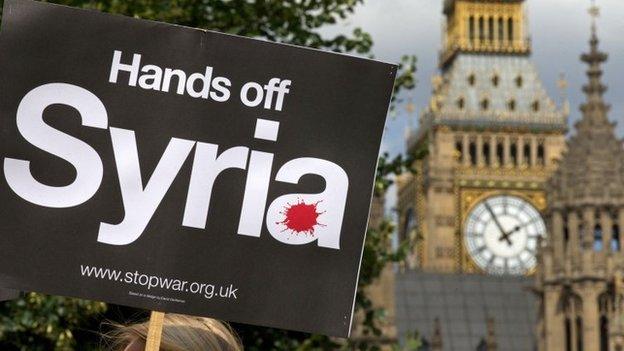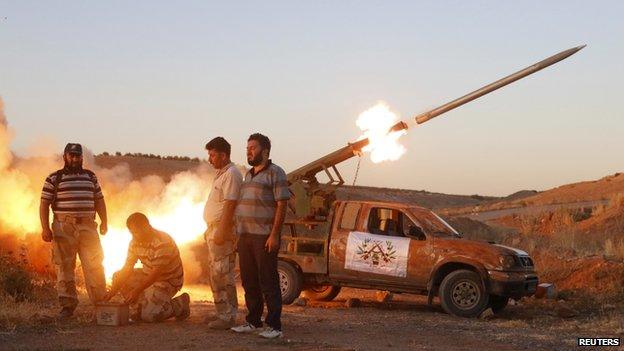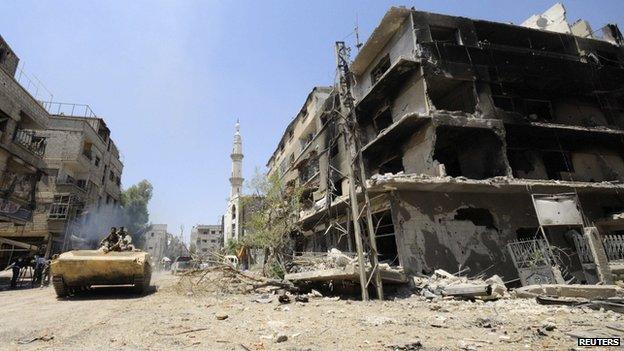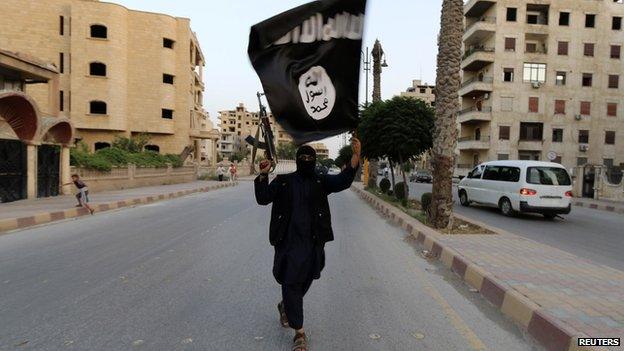Shadows of Iraq war and Syria vote loom over UK response to IS
- Published

There was a groundswell of public feeling in 2013 against military involvement in Syria
A year ago, hundreds of Syrians were gassed to death by their own government. International outrage was met with a resolution to act. The use of chemical weapons was the red line crossed.
In Washington, London and Paris plans were finalised for punitive air strikes against the regime of Syrian President Bashar al-Assad.
US President Barack Obama - previously so cautious about clattering into another Middle East cauldron of religious and political strife - said the world had to act. The rhetorical pin was pulled.
And nothing happened.
Eight days after the chemical attack, the House of Commons voted against a government motion to support military intervention. British participation in a military response had no parliamentary legitimacy and an angry prime minister understood.
The reason for the failure? Labour's opposition bolstered by 30 Conservative MPs.
In the following days, with the more distressing reports being broadcast from Syria, there was speculation the vote could be revisited.
But the government's mind was settled. Parliament - and the public - had spoken.

Fighters launch a rocket towards a military airport, controlled by forces loyal to President Bashar al-Assad
Journalists are not historians. Their judgements are instant and emphatic. At the time the moment was seen as a humbling defeat for the prime minister - the first time a government had lost a vote on military action in more than 300 years.
Labour leader Ed Miliband was considered strengthened. Parliament had wrestled control of foreign policy from the executive. A stand had been taken against an American-led mission.
The ghost of Iraq was being laid to rest. And it seemed Britain was losing its power.
The former Liberal Democrat leader Lord Ashdown said he felt "depressed" and "ashamed" by the vote.
The plan to strike Syria petered out. The United States would not go it alone.
Reluctant
A year on and the West agonises over how to confront the Islamic State (IS), the militant group formerly known as Isil or Isis. The United States is carrying out air strikes and Britain says it will consider arming the militants' Kurdish opponents if asked.
The government rejects suggestions this is a creeping mission without a clear objective. But where is British foreign policy now and how has it been shaped by the response to the Syria vote last year?
First, it's clear the government is reluctant to return to Parliament and seek approval for greater military intervention. If Britain was asked by the US to join air strikes a parliamentary vote would probably be needed.

Former minister Alistair Burt says David Cameron should "get over" his Commons defeat on Syria
Since the Iraq invasion in 2003, the convention to consult Parliament ahead of significant military action has hardened. But unlike last year there is a widespread political consensus around the government's response.
Labour has not called for a recall of parliament and has strained to show its support. Some Labour MPs have echoed a number of Conservatives in urging the government to do more.
The Labour MP Mike Gapes, a member of the Commons foreign affairs committee, has said the prime minister should "get over" last year's vote, recall Parliament and achieve a "massive vote for UK military intervention" against IS in Iraq.
Rebuff
But so far, the government has gone as far as it feels it can without the green light from Parliament. Exactly what action requires a green light and when remains unresolved.
But politically the prime minister cannot risk another rebuff by Parliament.
Second, the legacy of the Iraq war still casts a very long shadow over British foreign policy.
Mr Cameron has said there will be no British combat troops sent to Iraq. He's stressed it's not a new war in the making. He knows British voters have no appetite for that.

The growth of the Islamic State (IS) has raised questions in Britain about when and how to use military power abroad
But the problem now is very different. Tackling the threat of IS is a far more complex challenge than toppling Saddam Hussein.
Last year, many MPs were wary of supporting the disparate opposition forces fighting Assad in Syria. Who were they? Friend or foe?
The former foreign office minister Alistair Burt had responsibility for Middle East policy at the time of the chemical attack. In his view, the West's decision not to act helped the militant group grow, demoralising moderate opposition forces and strengthening what has become IS.
"All the consequences of not attacking last year have been bad," he told me. But Britain remains scared by the unintended consequences of the Iraq invasion and caution won the day.
'National soul-searching'
And what about Britain's place in the world?
After last year's vote, Chancellor George Osborne said there would be "national soul-searching" about Britain's role and whether it wants to play a part in upholding the international system.
Shortly after the next election, a new defence review will be published, the 12th since World War Two. It will try to assess what Britain should be doing.
And Mr Burt believes the conversation the chancellor called for has yet to happen.
"We have the fourth or fifth largest military budget in the world. We're a member of Nato and the UN Security Council. What's the point of having this power on paper if we're not able to use it?
"What are the circumstances in which we use it and what would the consultation process with the people be to ensure the people are behind the government who wants to do it?
"These are very big and serious questions and I don't think we have resolved it yet."